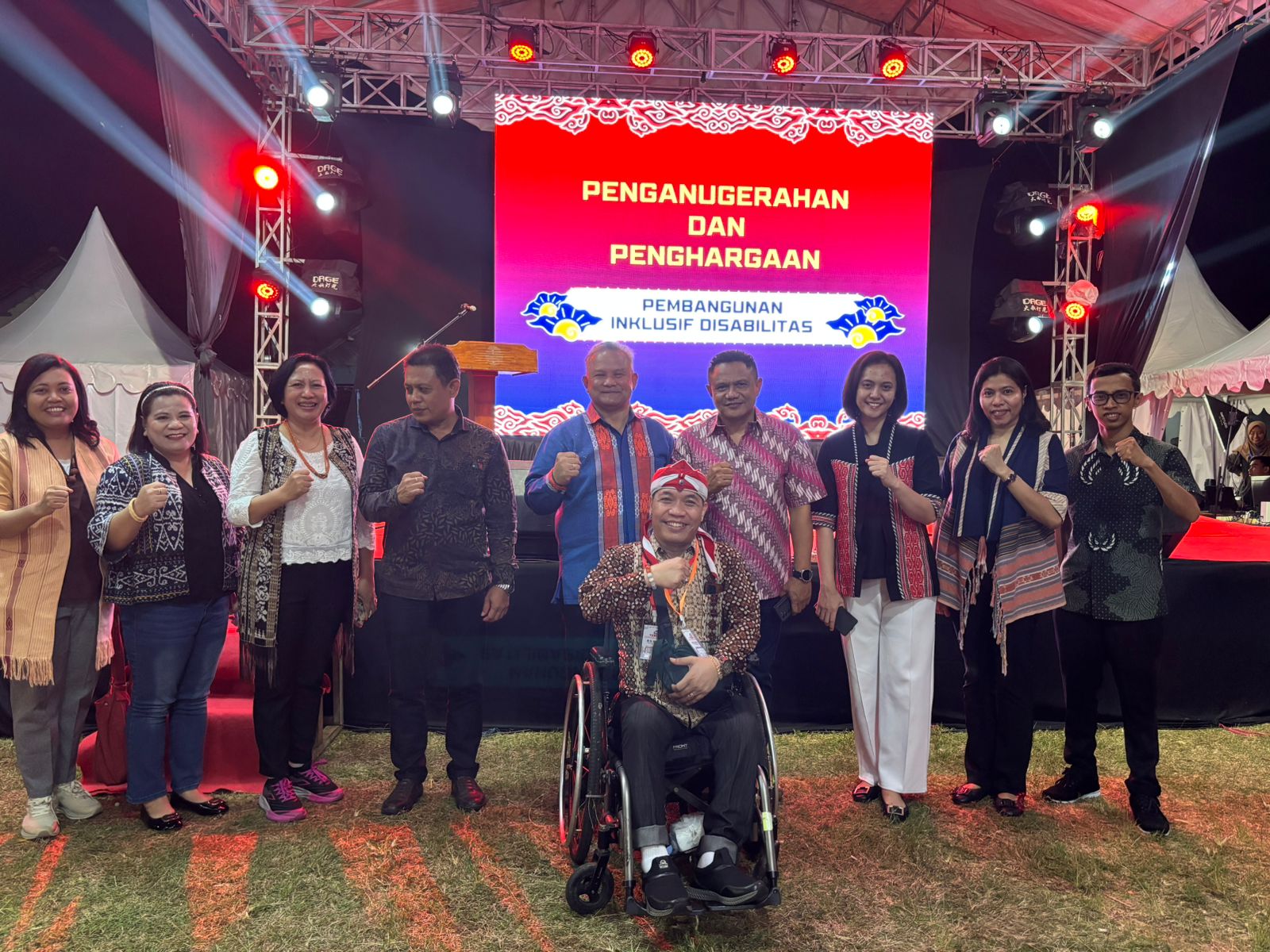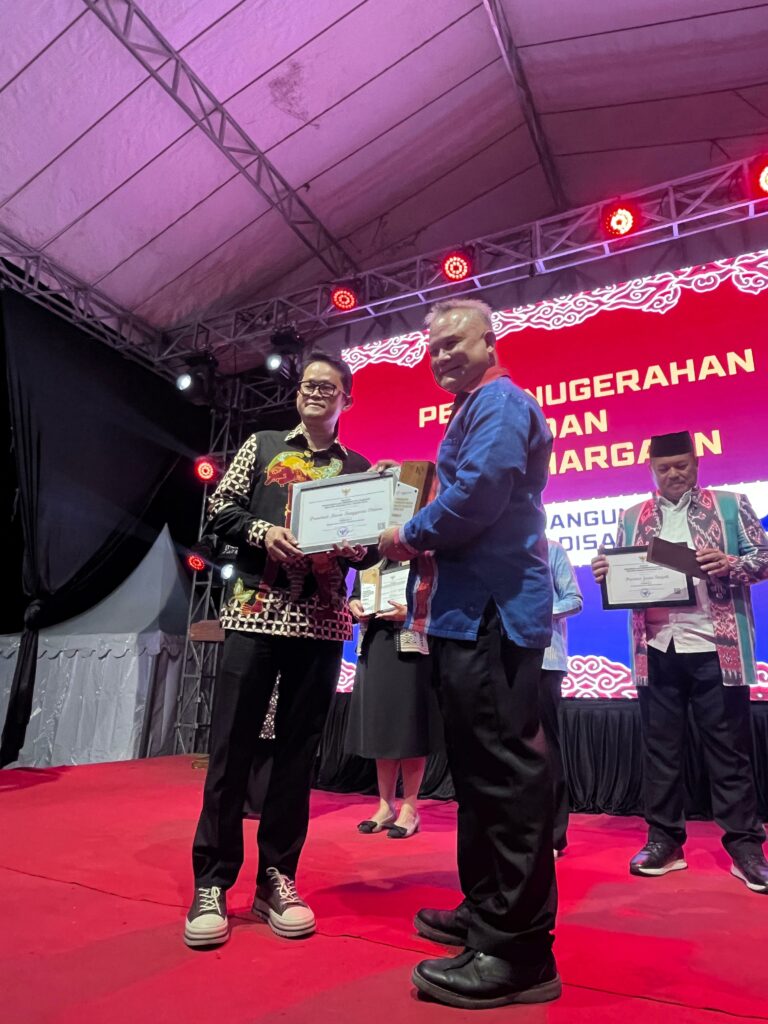Award for East Nusa Tenggara: A Commitment to Disability-Inclusive Development

The Provincial Government of East Nusa Tenggara (NTT – Nusa Tenggara Timur) has been named among the top five recipients of the Disability-Inclusive Local Government Award (PPID – Penghargaan Pemerintah Daerah Inklusif Disabilitas). NTT received the award from the Ministry of National Development Planning (Bappenas – Badan Perencanaan Pembangunan Nasional) in recognition of the province’s commitment to implementing disability-inclusive planning and development. It shared the award with Jakarta, Central Java, South Kalimantan, and Yogyakarta.
The award ceremony took place on 3 September 2025 in Durajaya Village, Cirebon Regency, as part of the closing ceremony for the Sixth Inclusion Gathering (Temu Inklusi). This biennial national forum, initiated by the Sasana Inclusion and the Disability Advocacy Movement (SIGAB Indonesia – Sasana Inklusi dan Gerakan Advokasi Difabel) and supported by the Australia-Indonesia Partnership Towards an Inclusive Society (INKLUSI), provides a strategic platform for disability rights advocates, civil society organisations and government stakeholders. The event was attended by senior officials from the national and subnational governments, as well as hundreds of representatives from organisations of people with disabilities (OPD – Organisasi Penyandang Disabilitas), civil society activists and academics from across Indonesia.
Two Pillars: Policy Alignment and Public Participation
NTT’s success reflects a paradigm shift underpinned by strong policy commitments, including Regional Regulation (Perda – Peraturan Daerah) No. 6 of 2022 on the Empowerment and Fulfilment of the Rights of People with Disabilities, along with several governor regulations. These commitments have been translated into concrete programs on the ground. In employment, the provincial government met the 2% quota for the 2024 civil service intake (CPNS – Calon Pegawai Negeri Sipil), with 14 candidates with disability declared successful. In addition, Disability Employment Service Units (ULD – Unit Layanan Disabilitas) have been established at the provincial level and facilitated in several districts, while social security protection has been extended to 19,998 informal sector workers with disabilities.
Maliki, Deputy for Community Empowerment, Population and Employment at Bappenas, who attended and presented the award, said it carries real meaning.
“This award is more than symbolic. It affirms that genuine development must fully involve people with disabilities, from planning through to evaluation,” he said.
Alfonsus Theodorus, Head of NTT Province’s Regional Development Research and Innovation Agency (BAPPERIDA – Badan Perencanaan Pembangunan, Riset, dan Inovasi Daerah), noted that the award crowns a long, transformative process.
“This award creates opportunities to map and optimise financing support more effectively, whether through cross-stakeholder budget mechanisms or direct contributions from development partners,” he said.
On economic empowerment, the provincial government has provided business capital support to 120 people with disabilities. It has also issued Governor Regulation (Pergub – Peraturan Gubernur) No. 43 of 2025, reducing taxes on motor vehicles for people with disabilities. Two core pillars drive these initiatives: the participatory governance innovation, Inclusive Development Planning for Vulnerable Groups (MUSIK KEREN – Musrenbang Inklusif Kelompok Rentan), and the strategic framework of the Regional Action Plan (RAD – Rencana Aksi Daerah) for People with Disabilities. Both initiatives were developed with technical support from SKALA, the Australia-Indonesia Partnership for Decentralisation to Improve Basic Services (SKALA – Program Kemitraan Australia-Indonesia untuk Akselerasi Layanan Dasar). MUSIK KEREN functions as a bottom-up mechanism that translates community aspirations into concrete budget commitments. The RAD, in turn, provides a policy compass to ensure each proposed program rests on a robust strategy, delivering measurable and direct benefits, especially to vulnerable communities.
Tangible Impact: Empowerment and Community Recognition
The collaborative development process is delivering results on the ground. NTT has not stopped at achievements at home; it is actively sharing its good practices with other regions, including Banten, Gorontalo, Papua, and Yogyakarta. That said, the provincial government recognises ongoing challenges, such as limited disaggregated data, human resource capacity constraints, and unconsolidated budgets. By continuing to strengthen commitment and collaboration, NTT is positioning itself as an inspiration for disability-inclusive development in Indonesia.







